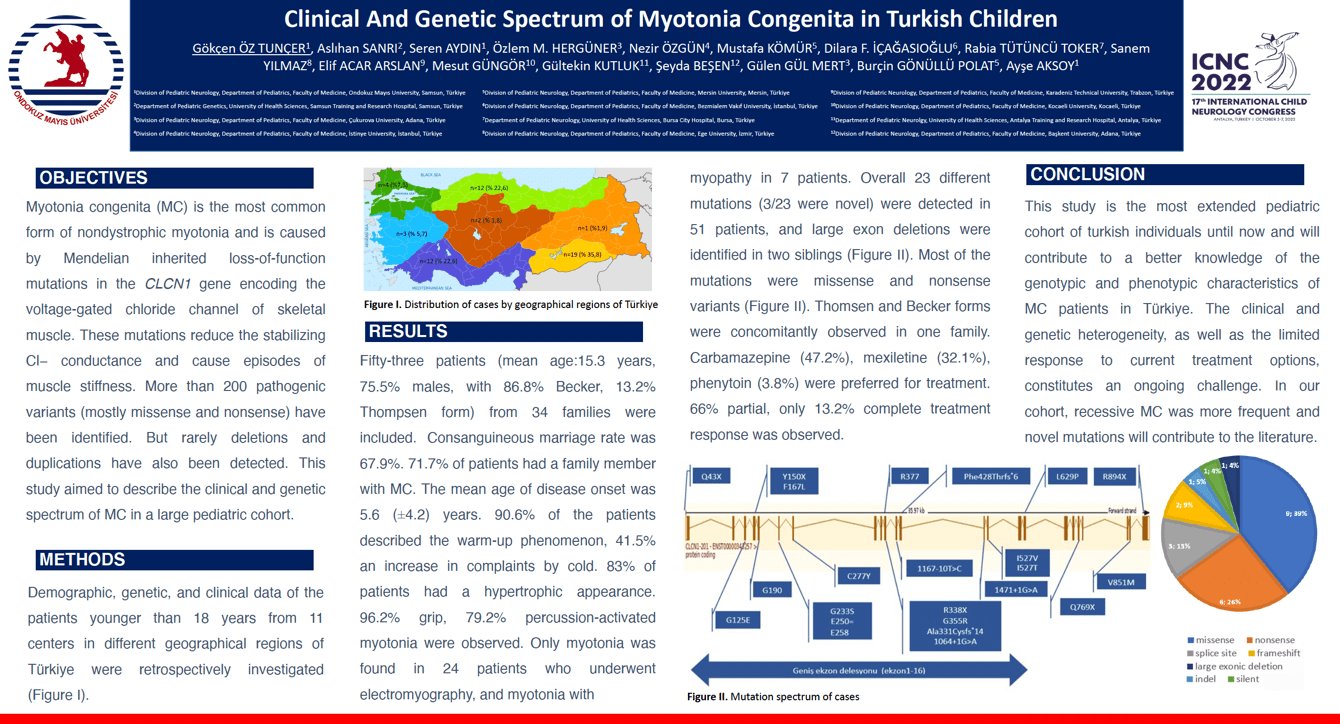Clinical And Genetic Spectrum of Myotonia Congenita in Turkish Children
Gokcen Oz Tuncer, Aslıhan Sanrı, Seren Aydın , Ozlem Hergüner, Nezir Ozgün, Mustafa Kömür, Dilara Füsun İçağasıoğlu, Rabia Tütüncü Toker, Sanem Yılmaz, Elif Acar Arslan , Mesut Güngör , Gültekin Kutluk, Şeyda Beşen, Gülen Gül Mert, Burçin Gönüllü Polat, Ayşe Aksoy
Objectives: Myotonia congenita (MC) is the most common form of nondystrophic myotonia and is caused by Mendelian inherited mutations in the CLCN1 gene encoding the voltage-gated chloride channel of skeletal muscle. The study aimed to describe the clinical and genetic spectrum of MC in a large pediatric cohort. Methods: Demographic, genetic, and clinical data of the patients younger than 18 years from 11 centers in different geographical regions of Turkey were retrospectively investigated. Results: Fifty-three patients (mean age:15.3 years, 75.5% males, with 86.8% Becker, 13.2% Thompsen form) from 34 families were included. Consanguineous marriage rate was 67.9%. 71.7% of patients had a family member with MC. The mean age of disease onset was 5.6 (±4.2) years. 90.6% of the patients described the warm-up phenomenon, 41.5% an increase in complaints by cold. 83% of patients had a hypertrophic appearance. 96.2% grip, 79.2% percussion-activated myotonia were observed. Only myotonia was found in 24 patients who underwent electromyography, and myotonia with myopathy in 7 patients. Overall 23 different mutations (3/23 were novel) were detected in 51 patients, and large exon deletions were identified in two siblings. Thompsen and Becker forms were observed concomitantly in one family. Carbamazepine (47.2%), mexiletine (32.1%), phenytoin (3.8%) were preferred for treatment. 66% partial, only 13.2% complete treatment response was observed. Conclusion: The clinical and genetic heterogeneity, as well as the limited response to current treatment options, constitutes an ongoing challenge. In our cohort, recessive MC was more frequent and novel mutations will contribute to the literature.
Keywords: Myotonia Congenita, Genetic, Child
Gokcen Oz Tuncer
Ondokuz Mayıs University, Faculty of Medicine
Turkey
Aslıhan Sanrı
University of Health Sciences, Samsun Training and Research Hospital
Turkey
Seren Aydın
Ondokuz Mayıs University, Faculty of Medicine
Turkey
Ozlem Hergüner
Cukurova University, Faculty of Medicine
Turkey
Nezir Ozgün
Mardin Artuklu University, Faculty of Medicine
Turkey
Mustafa Kömür
Mersin University, Faculty of Medicine
Turkey
Dilara Füsun İçağasıoğlu
Bezmialem Vakıf University, Faculty of Medicine
Turkey
Objectives: Myotonia congenita (MC) is the most common form of nondystrophic myotonia and is caused by Mendelian inherited mutations in the CLCN1 gene encoding the voltage-gated chloride channel of skeletal muscle. The study aimed to describe the clinical and genetic spectrum of MC in a large pediatric cohort. Methods: Demographic, genetic, and clinical data of the patients younger than 18 years from 11 centers in different geographical regions of Turkey were retrospectively investigated. Results: Fifty-three patients (mean age:15.3 years, 75.5% males, with 86.8% Becker, 13.2% Thompsen form) from 34 families were included. Consanguineous marriage rate was 67.9%. 71.7% of patients had a family member with MC. The mean age of disease onset was 5.6 (±4.2) years. 90.6% of the patients described the warm-up phenomenon, 41.5% an increase in complaints by cold. 83% of patients had a hypertrophic appearance. 96.2% grip, 79.2% percussion-activated myotonia were observed. Only myotonia was found in 24 patients who underwent electromyography, and myotonia with myopathy in 7 patients. Overall 23 different mutations (3/23 were novel) were detected in 51 patients, and large exon deletions were identified in two siblings. Thompsen and Becker forms were observed concomitantly in one family. Carbamazepine (47.2%), mexiletine (32.1%), phenytoin (3.8%) were preferred for treatment. 66% partial, only 13.2% complete treatment response was observed. Conclusion: The clinical and genetic heterogeneity, as well as the limited response to current treatment options, constitutes an ongoing challenge. In our cohort, recessive MC was more frequent and novel mutations will contribute to the literature.
Keywords: Myotonia Congenita, Genetic, Child
Gokcen Oz Tuncer
Ondokuz Mayıs University, Faculty of Medicine
Turkey
Aslıhan Sanrı
University of Health Sciences, Samsun Training and Research Hospital
Turkey
Seren Aydın
Ondokuz Mayıs University, Faculty of Medicine
Turkey
Ozlem Hergüner
Cukurova University, Faculty of Medicine
Turkey
Nezir Ozgün
Mardin Artuklu University, Faculty of Medicine
Turkey
Mustafa Kömür
Mersin University, Faculty of Medicine
Turkey
Dilara Füsun İçağasıoğlu
Bezmialem Vakıf University, Faculty of Medicine
Turkey

RGokcen Oz Tuncer
Ondokuz Mayıs University, Faculty of Medicine Turkey
Ondokuz Mayıs University, Faculty of Medicine Turkey